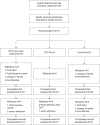Effectiveness of weekly cognitive stimulation therapy for people with dementia and the additional impact of enhancing cognitive stimulation therapy with a carer training program
- PMID: 25525349
- PMCID: PMC4267515
- DOI: 10.2147/CIA.S66232
Effectiveness of weekly cognitive stimulation therapy for people with dementia and the additional impact of enhancing cognitive stimulation therapy with a carer training program
Abstract
Purpose of the study: Cognitive stimulation therapy (CST) is a widely used, evidence-based intervention for people with dementia (PwD). Although designed as a 14 session, twice weekly intervention, many services in the UK deliver CST once a week for 14 weeks. However, this method of delivery has yet to be evaluated. In addition, CST does not include any formal carer training. This study aimed to evaluate the effectiveness of once weekly CST and determine any additional impact when enhanced with a carer training program.
Design and methods: A single blind, randomized controlled trial was conducted. Sixty eight PwD and their carers were recruited through three community Memory Assessment Services. PwD and their carers were randomized to one of three conditions: CST plus carer training, CST only, or a wait list control. PwD were administered standardized measures of cognition, quality of life, and quality of relationship with carer at baseline and the 15 week follow-up.
Results: There were no baseline differences across the three groups. At follow-up, there were no significant differences between PwD in the three groups on any outcomes.
Implications: Weekly CST with or without carer training may not be an effective form of delivery. Several possible explanations for the outcomes are proposed. Weekly CST may not offer the necessary "dose" required to combat decline, and equally the carer training may have been too brief to have made a difference. Services currently offering weekly CST should collect routine outcome data to support its use and provide practice-based evidence.
Keywords: Alzheimer’s disease; caregiver; cognition; intervention.
Figures
References
-
- Alzheimer’s Society . Dementia 2012: A national challenge. London: Alzheimer’s Society; 2012. [Accessed November 5, 2014]. Available from: http://www.alzheimers.org.uk/site/scripts/download_info.php?fileID=1389.
-
- Aguirre E, Woods B, Spector A, Orrell M. Cognitive stimulation for dementia: a systematic review of the evidence of effectiveness from randomised controlled trails. Ageing Res Rev. 2013;12:253–262. - PubMed
-
- Spector A, Thorgrimsen L, Woods B, et al. Efficacy of an evidence-based cognitive stimulation therapy programme for people with dementia: randomised controlled trial. Br J Psychiatry. 2003;183:248–254. - PubMed
-
- Knapp M, Thorgrimsen L, Patel A, et al. Cognitive stimulation therapy for people with dementia: cost effectiveness analysis. Br J Psychiatry. 2006;188:574–580. - PubMed
-
- Aguirre E, Hoare Z, Streater A, et al. Cognitive stimulation therapy (CST) for dementia – who benefits most? Int J Geriatr Psychiatry. 2013;28:284–290. - PubMed
Publication types
MeSH terms
LinkOut - more resources
Full Text Sources
Other Literature Sources
Medical
Research Materials


